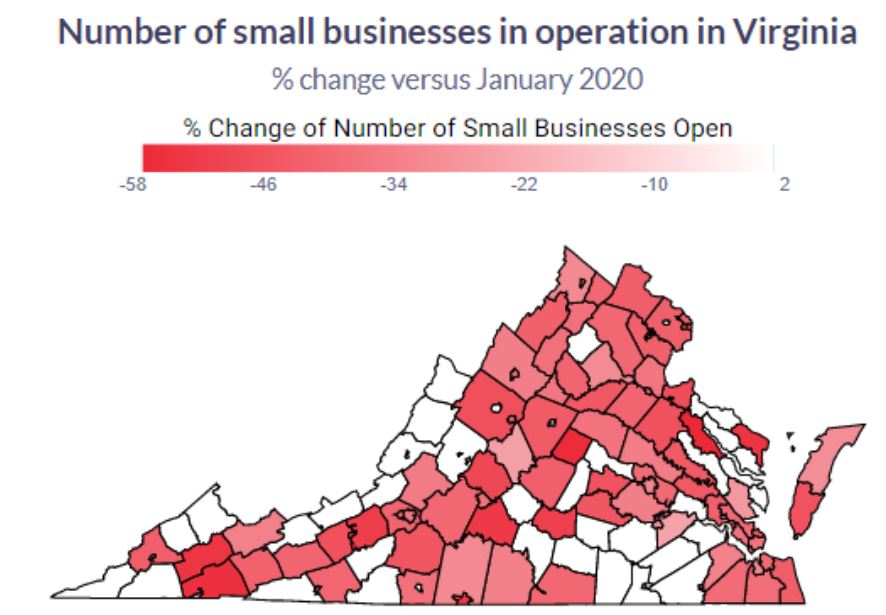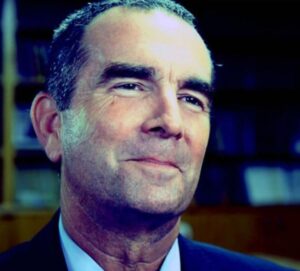Michael Martz with the Richmond Times-Dispatch writes on Governor Ralph Northam’s hamfisted attempt to use the public trust for partisan gain with a $350 million rescue package paid for by John and Jane Q. Taxpayer.
The proposed package also includes the help requested by Virginia Tourism President Rita McClenny, who appeared before the House and Senate budget committees this year to make the case for aid to the tourism and hospitality industry.
Those businesses employ about 10% of workers but represent 45% of the jobs lost during the pandemic, she told Senate Finance in May. “We want to prepare our communities to open their doors to visitors.”
Of course, the commonwealth is awash in federal COVID relief to the tune of $4.3 billion dollars. One might even be encouraged to think that Northam — true to the spirit of pandemic — might even be inclined to treat the public relief as a public opportunity to show public solidarity with all Virginians.
Instead, Northam and the Virginia Democrats chose to turn a taxpayer-fueled bailout into a partisan romp.
Northam unveiled the $353 million package with House Speaker Eileen Filler-Corn, D-Fairfax, and Senate Majority Leader Dick Saslaw, D-Fairfax, at the beach resort city in a show of unity as the General Assembly prepares to convene on Aug. 2 to determine how to spend the state’s share of the $1.9 trillion American Rescue Plan Act that Democrats passed in Congress.
Who else was there, you ask?
Speaker Eileen Filler-Corn (D-Fairfax) was double sure to make certain it was a Democrats-only announcement:
Now, I don’t know about the rest of the world. But taking $4 billion in federal taxpayer bailout dollars after a once-in-100 year pandemic and using these public funds for a partisan speaking tour seems corrupt. Not in the sense of actual corruption in the legal sense, but a moral corruption that refuses to get through the tough times together as one.
That strikes me as a disgusting new low for those keen enough to pick up on the gambit. Not able to run on their record, Virginia Democrats have chosen to take advantage of the public credit card and spend it on your behalf — as if they were doing the rest of us a favor.
The opportunity to not be partisan was missed. Moreover, the opportunity to tackle Virginia problems as we head into a 21st century economy with 20th century tools and a 19th century tax code was entirely missed.
One might be led to believe that these problems impact all Virginians and would require a ministry of all talents to tackle them. You would be right, yet our politicians (and our political climate) doesn’t serve this purpose to any degree. When we miss these opportunities for rank partisan gain? We should heap every single red hot coal of contempt upon their heads for doing so.
So much for moonwalking things back. But why focus on Virginia Beach and Williamsburg? Why did Youngkin during the nomination contest start with and focus on Hampton Roads as a base of support? Why is Northam desperately throwing cash at businesses and community leaders large and small — campaigning with the public trust, if you will?
I want to share with you a few startling numbers, first and foremost with the tourism industry in Virginia and the loss of low-income jobs related to that industry, and then second with the absolute hammering small businesses took during the pandemic.
Why Tourism Matters. Tourism and hospitality employ roughly 85,000 people in the Hampton Roads area, consisting of about 11.4% of the economy. Roughly 5% of the region’s GDP is dependent upon tourism and hospitality — more than $4 billion annually resulting in $150 million in tax revenue to localities for schools, deputies and public safety.
Where do people go? Virginia Beach and Williamsburg.
Statewide, this number was north of $25.8 billion in Virginia in 2018. While one might be temporarily deceived by the V-shaped nature of the recovery in places such as Hampton Roads, the nature of the recovery is very much one sided — leaning very much to the larger businesses where the economic crisis could be weathered and against both small businesses and lower-income families where $15-per-hour wages are affordable if you are McDonalds or Wendys, but not so much if you are the struggling mom-and-pop firm just trying to get by.
Workforce Investment + Microfinance = Small Business Growth
This is the graphic that is going to make you equal parts shocked and angry:

In Fluvanna County, the net shift has been 56.8% since January 2020, a second place finish only behind Essex County at 58%. Fairfax County? 38.1%. Virginia Beach? 38.9%. Nelson County weathers the storm best at 15.4%.
Here’s a policy position that makes sense:
- Use some fraction of the remaining $4 billion of federal aid for workforce development and microfinance grants. That the economy is resurging without the surplus labor should bother folks. That the inducement of $15-per-hour wages plus absurd signing bonuses to work in the fast food industry isn’t pulling people off the couch signals the disconnect between public education and meaningful vocational work.
- Develop a system of free community college education on par with the Missouri A+ Scholarship model. This removes the roadblock to low-income students of the relative cost of workforce retraining — a cost that can be maintained and shouldered as automation begins to replace work and would be a boon to rural and low-income families.
- Link microfinance to small business training and development. Two out of three new small businesses fail. Yet when linked to microfinance, two out of three microfinanced small businesses succeed. Microfinance institutions (MFIs) encourage small businesses to share best practices as a condition of their loan through monthly meetings, education, budgeting and advisement.
Want to see an excellent example? Check out the Staunton Creative Community Fund — a success story so wild, not only did it help rejuvenate Staunton’s downtown district but is now expanding into the Shenandoah Valley. GO Virginia can be instructed to work directly with planning district commissions (PDCs) to help assist region initiatives to focus on precisely those intersecting economies useful to small business entrepreneurs, assisting with further grants and larger opportunities for investment. - Invest in local modes of economy. Let’s face it — hybrid models of working from home while occasionally visiting the office isn’t going away. We are inches away from rural broadband, but much more can be done to encourage local modes of economy. Open back up that local country store. Encourage that local farmer’s market. We don’t need to gentrify our neighborhoods to rejuvenate our economies; we should be offering them the education and means to retrain for the 21st century — and that all starts with a world-class and accessible Virginia Community College System (which in many ways we already have).
This is no clarion call to nationalize small business development, to be sure.
Far from it — this is the clarion call to create opportunities for self-reliant, self-sufficient small businesses produced and sustained in their own communities — the backbone of any free society.
This is the difference between a society that creates opportunities for citizens to become the best versions of themselves, and the society that enforces equality in the hopeless effort to eradicate excellence.
Choose Your Fighter: Opportunity vs. Collectivism
In the meantime, Virginia Republicans need to realize that Northam and McAuliffe are not losing this race for the hearts and minds of Virginians. We are merely on par at present, with Youngkin and the Republican ticket neck and neck — but by no means winning this contest outright.
The second gambit? Parallel institutions, folks. We are not going to beat the Democrats at their own game of dispensing money from the public largess, whether that is in education, the arts, media, culture, academia or the local and state bureaucracies.
Where we can succeed — and where we will succeed — is in creating opportunities for excellence in ways the straightjacket of Virginia government cannot.
Create a constituency for free enterprise and you’ll be surprised at how many people will prefer a hand-up over a hand-out. Create pathways for more meaningful work and you will be surprised at how many people desire a better life.
After all, if the Democrats were right that government can be a lowercase-g god? You wouldn’t be reading about this:
Cuba Libre! Prayers of Freedom for the Cuban people from the tyranny of socialism and communism. Cuba hasn’t had a free election in 60 plus years, give them a voice! 🇨🇺 🇺🇸 https://t.co/MQD6VOehRR
— Jason Miyares (@JasonMiyaresVA) July 11, 2021
Shaun Kenney is the editor of The Republican Standard, former chairman of the Board of Supervisors for Fluvanna County, and a former executive director of the Republican Party of Virginia. This column is republished with permission from The Republican Standard.



Leave a Reply
You must be logged in to post a comment.